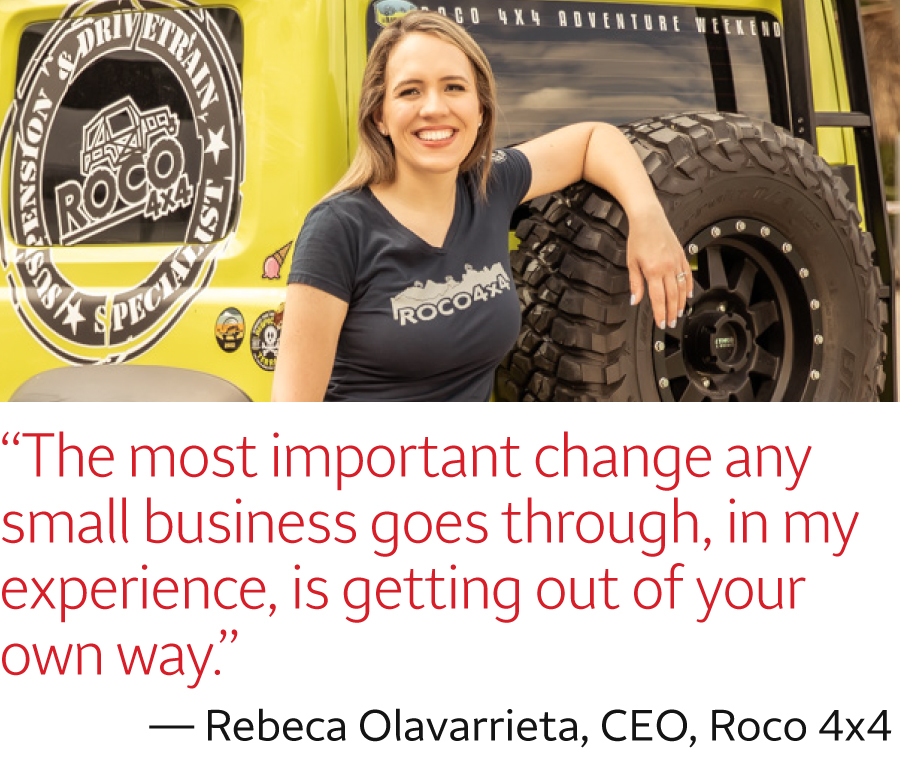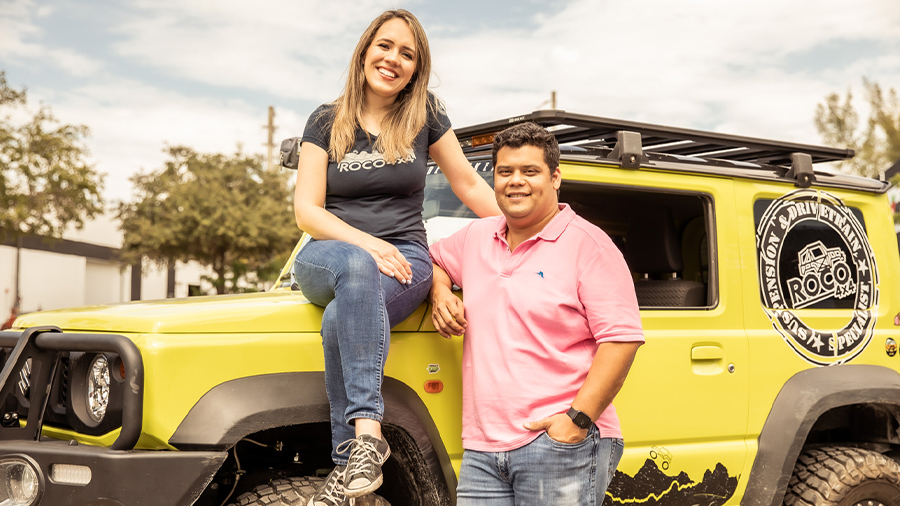Four-wheelers, three owners, one family
The owners of Roco 4×4 are proving it’s possible to not just survive, but thrive in a family business.

Deposit products offered by Wells Fargo Bank, N.A. Member FDIC.
Rebeca Olavarrieta, CEO and co-owner of Roco 4×4, a jeep and truck customization and specialization shop in Doral, Florida, admits owning and running a family business isn’t for everybody. Her husband, Carlos Flores, and brother, Ricardo Olavarrieta, are her business partners.
The racecar driving CEO has heard it all: “That would be so tough,” and “I would hate to work alongside my husband and my brother.” But she sees their unique situation as more enhancement than detriment.

“It’s really weird,” she said with a laugh. “We’ve really developed our ‘Roco voice.’ We all want the business to thrive, and we’re able to separate husband-wife-brother-sister during our conversations as partners. It really behooves all of us to put our egos aside and make things happen.”
The two-decade history of Roco is really about just that — pushing ego aside.
In 2008, as the Great Recession wreaked havoc on the United States economy, then sole-owner Ricardo Olavarrieta needed help staying afloat as business slowed significantly. He turned to his sister, who was racing cars but has a background in business and finance, to join the business. Two years later, they met Flores as a customer, before he officially joined Roco in 2011.
Today, Flores focuses on expanding Roco’s brand globally, while Rebeca and Ricardo Olavarrieta handle the other parts of the business.

Roco 4×4 customizes jeeps, trucks, cars, and other vehicles to the exact specifications of clients who come from all over the world to visit its headquarters in Miami. Some want water tanks for their vehicles if they’re going to be off the grid, others may ask for a custom lighting kit if they’re headed to a particularly dim area.
Rebeca Olavarrieta’s love of cars, trucks — really anything with wheels — is rooted in the freedom driving allows and the responsibility that managing the road on your own provides. For a young woman growing up in the 1990s, she said, driving her car was one of the few safe spaces available.
Add to that freedom and responsibility her penchant for challenges, as well as her disdain for assumptions of what women could achieve, and becoming a racecar driver and automotive CEO was no longer a want, it was a need.
“My mom always would say I went the hardest way to do things,” said Rebeca Olavarrieta. “When I was growing up, women were pigeonholed into positions. [When I was driving] I enjoyed that I was swimming against the current in the automotive industry. And with Roco, I really had to look at myself in the mirror and say, ‘you are strong and capable of learning any trade.’ I had to really dive into how things work, into the parts, and the shop.”
A banker you can trust
One area in which Rebeca Olavarrieta’s learning curve wasn’t so steep was Roco’s relationship with Wells Fargo. The company is a legacy-Wachovia customer and has been a customer for its entire existence, with a business line of credit and checking account.
“The relationship with Wells Fargo has been so important to our business,” Rebeca Olavarrieta said. “And I tell everybody, even if it's not Wells Fargo, you have to have a banker that you trust and that you meet regularly with. I think it was said the number one detrimental factor for failing small businesses is having access to lending and that they don't invest the time to keep their books. Understanding how pivotal banking is has been so important for us, and Wells Fargo has made a big difference.”
She’s continued her personal relationship with Wells Fargo through Connect to MoreSM — a program that puts women in the driver's seat to access opportunities — from networking and coaching to a rich library of resources, all tailored to meet their needs.

“I was blessed to have a [Connect to More] session involving one of Wells Fargo's economists,” said Rebeca Olavarrieta. “To be able to discuss forecasted economic data allowed me to understand consumer behavior and how businesses can prepare to face the changes in disposable income. I started to apply the thinking that small businesses can't control the economy, but we have to always be prepared for change.”
The path forward
Between 2007 and 2018, the number of businesses owned by minority women grew by 163%, according to the Minority Business Development Agency.
However, the COVID-19 pandemic provided a hurdle for the decade-long surge in entrepreneurship. Rebeca Olavarrieta and her co-owners again pushed their ego aside and began to have conversations about topics they’d never broached — like mental health, wellness, and work-life balance — and realized they might be hurting the business by trying to do everything.

“The most important change any small business goes through, in my experience, is getting out of your own way,” she said. “We, business owners, believe we can do everything and understand our business better than anyone. To grow, you have to hire people who are smarter than you. That can be humbling, but it’s helped us get out of our own way and made our team better than they were.”
Roco empowered its tour guides, mechanics — essentially all its employees — to be subject matter experts and encouraged them to make recommendations and take on and lead complex projects.
Surviving the pandemic has forever changed how Rebeca Olavarrieta sees the future of her business.
“Two years ago, it was all about ‘growth, growth, growth,’” she said. “Now it’s like, ‘yes we have to grow, but what would that mean for us and our staff from a personal perspective?’ It’s not only about growth anymore. I want to have a profitable company, have a significant market share, and give our employees a great work environment and better lifestyle than they have now.”
Deposit products offered by Wells Fargo Bank, N.A. Member FDIC.






